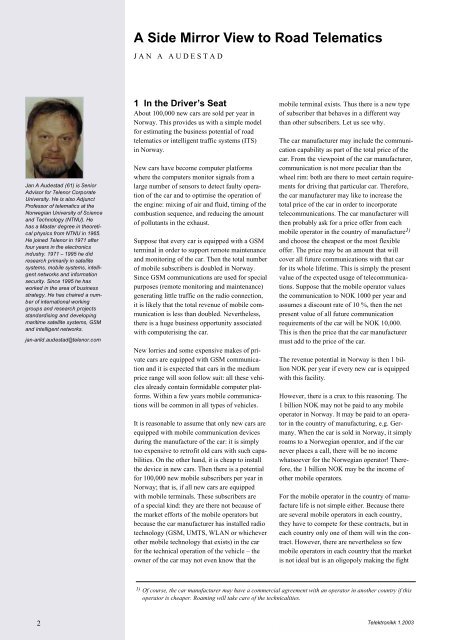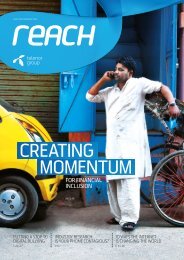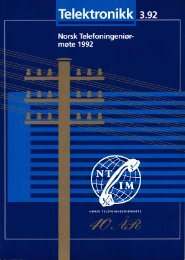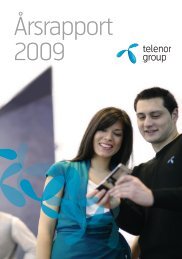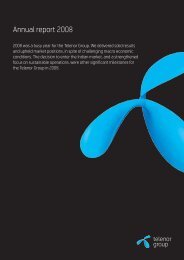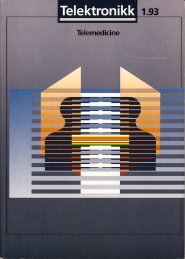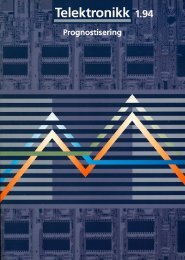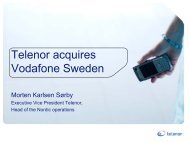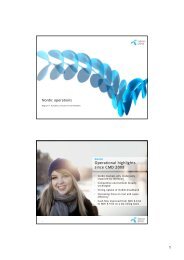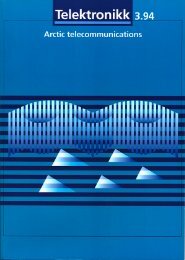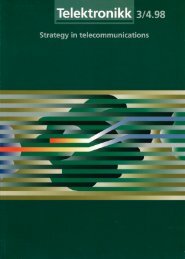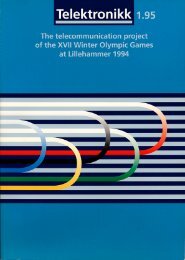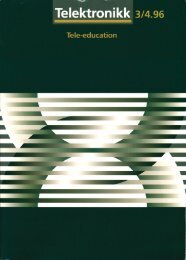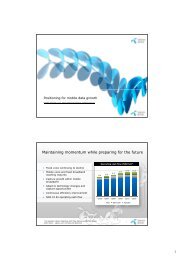Intelligent Transport Systems - Telenor
Intelligent Transport Systems - Telenor
Intelligent Transport Systems - Telenor
Create successful ePaper yourself
Turn your PDF publications into a flip-book with our unique Google optimized e-Paper software.
Jan A Audestad (61) is Senior<br />
Advisor for <strong>Telenor</strong> Corporate<br />
University. He is also Adjunct<br />
Professor of telematics at the<br />
Norwegian University of Science<br />
and Technology (NTNU). He<br />
has a Master degree in theoretical<br />
physics from NTNU in 1965.<br />
He joined <strong>Telenor</strong> in 1971 after<br />
four years in the electronics<br />
industry. 1971 – 1995 he did<br />
research primarily in satellite<br />
systems, mobile systems, intelligent<br />
networks and information<br />
security. Since 1995 he has<br />
worked in the area of business<br />
strategy. He has chaired a number<br />
of international working<br />
groups and research projects<br />
standardising and developing<br />
maritime satellite systems, GSM<br />
and intelligent networks.<br />
jan-arild.audestad@telenor.com<br />
2<br />
A Side Mirror View to Road Telematics<br />
JAN A AUDESTAD<br />
1 In the Driver’s Seat<br />
About 100,000 new cars are sold per year in<br />
Norway. This provides us with a simple model<br />
for estimating the business potential of road<br />
telematics or intelligent traffic systems (ITS)<br />
in Norway.<br />
New cars have become computer platforms<br />
where the computers monitor signals from a<br />
large number of sensors to detect faulty operation<br />
of the car and to optimise the operation of<br />
the engine: mixing of air and fluid, timing of the<br />
combustion sequence, and reducing the amount<br />
of pollutants in the exhaust.<br />
Suppose that every car is equipped with a GSM<br />
terminal in order to support remote maintenance<br />
and monitoring of the car. Then the total number<br />
of mobile subscribers is doubled in Norway.<br />
Since GSM communications are used for special<br />
purposes (remote monitoring and maintenance)<br />
generating little traffic on the radio connection,<br />
it is likely that the total revenue of mobile communication<br />
is less than doubled. Nevertheless,<br />
there is a huge business opportunity associated<br />
with computerising the car.<br />
New lorries and some expensive makes of private<br />
cars are equipped with GSM communication<br />
and it is expected that cars in the medium<br />
price range will soon follow suit: all these vehicles<br />
already contain formidable computer platforms.<br />
Within a few years mobile communications<br />
will be common in all types of vehicles.<br />
It is reasonable to assume that only new cars are<br />
equipped with mobile communication devices<br />
during the manufacture of the car: it is simply<br />
too expensive to retrofit old cars with such capabilities.<br />
On the other hand, it is cheap to install<br />
the device in new cars. Then there is a potential<br />
for 100,000 new mobile subscribers per year in<br />
Norway; that is, if all new cars are equipped<br />
with mobile terminals. These subscribers are<br />
of a special kind: they are there not because of<br />
the market efforts of the mobile operators but<br />
because the car manufacturer has installed radio<br />
technology (GSM, UMTS, WLAN or whichever<br />
other mobile technology that exists) in the car<br />
for the technical operation of the vehicle – the<br />
owner of the car may not even know that the<br />
mobile terminal exists. Thus there is a new type<br />
of subscriber that behaves in a different way<br />
than other subscribers. Let us see why.<br />
The car manufacturer may include the communication<br />
capability as part of the total price of the<br />
car. From the viewpoint of the car manufacturer,<br />
communication is not more peculiar than the<br />
wheel rim: both are there to meet certain requirements<br />
for driving that particular car. Therefore,<br />
the car manufacturer may like to increase the<br />
total price of the car in order to incorporate<br />
telecommunications. The car manufacturer will<br />
then probably ask for a price offer from each<br />
mobile operator in the country of manufacture 1)<br />
and choose the cheapest or the most flexible<br />
offer. The price may be an amount that will<br />
cover all future communications with that car<br />
for its whole lifetime. This is simply the present<br />
value of the expected usage of telecommunications.<br />
Suppose that the mobile operator values<br />
the communication to NOK 1000 per year and<br />
assumes a discount rate of 10 %, then the net<br />
present value of all future communication<br />
requirements of the car will be NOK 10,000.<br />
This is then the price that the car manufacturer<br />
must add to the price of the car.<br />
The revenue potential in Norway is then 1 billion<br />
NOK per year if every new car is equipped<br />
with this facility.<br />
However, there is a crux to this reasoning. The<br />
1 billion NOK may not be paid to any mobile<br />
operator in Norway. It may be paid to an operator<br />
in the country of manufacturing, e.g. Germany.<br />
When the car is sold in Norway, it simply<br />
roams to a Norwegian operator, and if the car<br />
never places a call, there will be no income<br />
whatsoever for the Norwegian operator! Therefore,<br />
the 1 billion NOK may be the income of<br />
other mobile operators.<br />
For the mobile operator in the country of manufacture<br />
life is not simple either. Because there<br />
are several mobile operators in each country,<br />
they have to compete for these contracts, but in<br />
each country only one of them will win the contract.<br />
However, there are nevertheless so few<br />
mobile operators in each country that the market<br />
is not ideal but is an oligopoly making the fight<br />
1) Of course, the car manufacturer may have a commercial agreement with an operator in another country if this<br />
operator is cheaper. Roaming will take care of the technicalities.<br />
Telektronikk 1.2003


